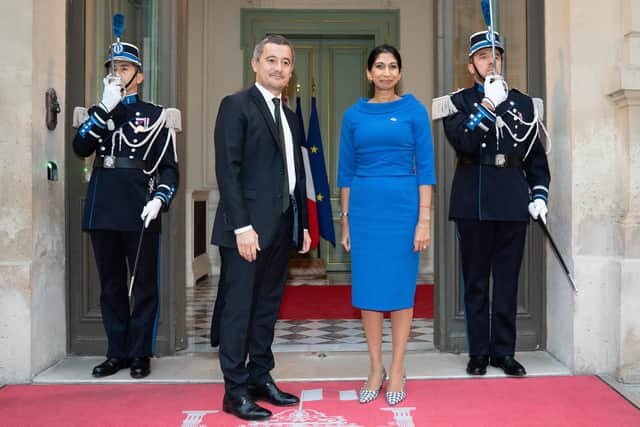Suella Braverman signs deal with France on Channel migrants
The agreement, hiking the figure paid to France by the UK to around €72 million (£63m) in 2022/23, will see British officers stationed in French control rooms for the first time and a 40 per cent boost in beach patrols along the country’s northern coastline.
The latest effort aimed at tackling the migrant crisis comes as the number of people arriving on the south coast after making the journey topped 40,000 for the year so far, with crossings continuing on Monday.
Advertisement
Hide AdAdvertisement
Hide AdPrime Minister Rishi Sunak said the move would contribute to his efforts to “grip illegal migration” and that he was “confident” numbers would come down over time, although he declined to guarantee they would fall next year.


But critics lambasted the deal, with Conservative MP for Dover Natalie Elphicke saying it “falls short of what is needed”.
Further measures signed off earlier in Paris by home secretary Suella Braverman and French interior minister Gerald Darmanin include drones and night vision equipment to help officers detect crossings, as well as stepping up surveillance around ports to prevent migrants entering the UK in lorries, with more CCTV and sniffer dogs.
The “activity will begin with immediate effect”, a Home Office policy paper detailing the agreement said, with the rise in French officers on beach patrols taking place “in the next five months”.
The Prime Minister told broadcasters ahead of the G20 summit in Bali: “I’m confident that we can get the numbers down. But I also want to be honest with people that it isn’t a single thing that will magically solve this. We can’t do it overnight.
“But people should be absolutely reassured that this is a top priority for me. There’s lots more that we need to do.”
Ms Elphicke said: “It doesn’t match the scale or urgency of the small boats crisis, or the increased risk of loss of life as winter approaches.”
Human rights group Amnesty International UK said the deal was no different from previous agreements and accused the Government of “recycling the same failed response”, while the Refugee Council said the move would “do little to end the crossings”.
Advertisement
Hide AdAdvertisement
Hide AdDescribing the agreement as a “small step in the right direction”, Labour leader Sir Keir Starmer said this was “a much bigger challenge that the Government still isn’t gripping” and warned of the cost to taxpayers.
SNP immigration spokesperson Anne McLauglin said: “We have seen deals like this before and they have failed to significantly improve the situation. The UK Government must instead focus on creating more safe and legal routes, which we know work, and address the backlog of asylum decisions.”
Ms Braverman, who is to meet neighbouring countries “as soon as possible” and will travel to Frankfurt later this week to discuss tackling serious organised crime with her G7 counterparts, said the “complex” problem was a “global challenge” which governments must work together to solve, adding: “We must do everything we can to stop people making these dangerous journeys and crack down on the criminal gangs."
Comments
Want to join the conversation? Please or to comment on this article.